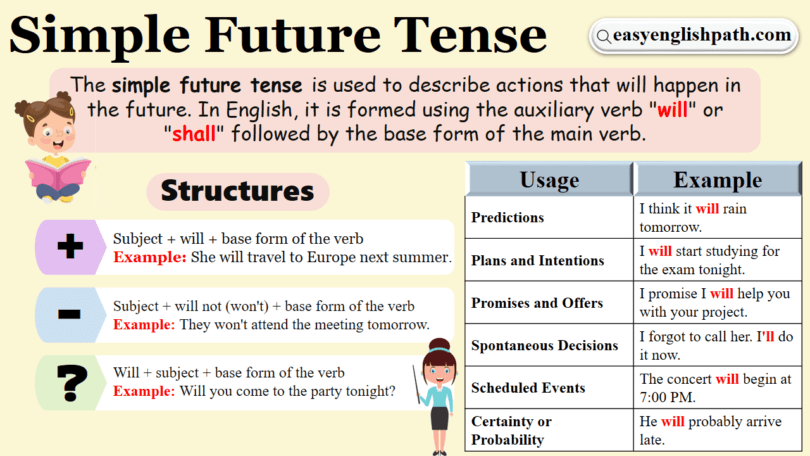The Simple Future Tense helps us talk about what will happen later. You can easily make it by adding just will or shall before a verb. It’s like saying, I will eat or She will dance. You can also use it to guess about tomorrow, plan something for later, or promise to do something in the future. It’s a simple way to talk about what’s coming next!
Definition of Simple Future Tense:
The Simple Future Tense is used to talk about actions that have not yet happened but will occur after the time of speaking. It is formed by using “will” (or sometimes “shall”) before the base form of the main verb.
Simple Future Tense Structure
Positive Sentences Structure:
Structure:
| Subject + will/shall + base form of the verb |
- I will go to the market.
- She will sing a song.
- They will eat an apple.
You can also use shall instead of will, but it’s less common nowadays, especially in American English.
Negative Sentences Structure:
It is quite easy to make the Simple Future Tense negative. You just need to add will not (which is often shortened to won’t) before the main verb
Structure:
| Subject + will not/won’t + base form of the verb |
- I + will not/won’t + go
- She + will not/won’t + dance
- They + will not/won’t + eat
So, you simply just insert will not or its contraction won’t
Question Sentences Structure:
To form a question in the Simple Future Tense, simply place “will” before the subject, followed by the base form of the verb.
Structure:
| Will + subject + base form of the verb? |
- Will they eat?
- Will I go?
- Will she dance?
Uses of Future Simple Tense:
1. We use this tense for different reasons but It’s often used to make predictions about the future based on present evidence or beliefs.
- I think it will rain tomorrow.
- She will become a doctor someday.
2. We can also use the Simple Future to talk about things we intend or plan to do in the future.
- I will call you later.
- They will go on vacation next month.
3. It’s used to make promises or offers, expressing a commitment to do something in the future.
- I will help you with your homework.
- He will buy you a present for your birthday.
4. Sometimes, we use the Simple Future to make decisions on the spot about something we will do in the future.
- The phone is ringing. I will answer it.
- I’m hungry. I think I’ll order pizza for dinner tonight.
How to form Simple Future Tense?
If we want to make the these Tense, you just need to add will or shall before the main verb. That’s it!
| Subject | Will/Shall | Base Form of Verb |
|---|---|---|
| I | will | go |
| You | will | eat |
| He/She/It | will | dance |
| We | will | study |
| You | will | play |
| They | will | travel |
Simple Future Tense vs. “Be Going To”
| Tense | Form | Use | Example |
|---|---|---|---|
| Simple Future | will + base verb | Used for decisions made at the moment, promises, offers, or predictions without evidence | I will call you later. |
| Be Going To | am/is/are + going to + base verb | Used for planned actions or predictions based on present evidence | I am going to visit grandma this weekend. |
Simple Future Tense Examples
- I will go to see my friend.
- You will eat your meal.
- He/She/It will dance at the party.
- We will study for the exams.
- You will play cricket with your friends.
- They will travel to Dubai by next month.
- I will call you when I arrive.
- She will start a new job next week.
- They will build a new house soon.
- We will celebrate your birthday tomorrow.
You May Also Like






